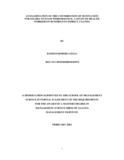AN EXAMINATION OF THE CONTRIBUTION OF MOTIVATION STRATEGIES TO STAFF PERFORMANCE: A STUDY OF HEALTH WORKERS IN BUNDIBUGYO DISRICT, UGANDA
Abstract
Motivation is crucial for organizations to function; without motivation employees will not put up their best and the company’s performance would be less efficient. The situation is even more serious in developing countries where working conditions are unattractive. It is in view of this that this study was conducted to examine the contribution of motivation strategies to staff performance in the public sector: a case study of health workers in Bundibugyo district. The case-study approach was adopted for the study with both qualitative and quantitative techniques such as stratified sampling and simple random sampling techniques were employed. Key informant interviews and questionnaires were the methods of data collection for the study and STATA software was used to analyse data collected from the field. The study found that, motivation packages for the health staff of Bundibugyo district were inadequate. This was evident in inadequate salaries and allowances, poor working and living conditions, inadequate supervison and limited opportunities for career growth and development. The implementation of “hard to reach” policy leaves out staff of the urban centres and yet the district is ‘“hard to reach”’. The results also show that motivation is affected by both monetory and non-monetory strategies. The study therefore concludes that there is the need to strengthen health systems to ensure effective service delivery and improved health outcomes. This can be achieved by addressing salary issues, staffing gaps, improving the living and working conditions and intensifying support supervision. The “hard to reach” policy should also be introduced in urban areas to ensure that all health staff are motivated. Government policies and guidelines should be implemented instead of being shelved.

